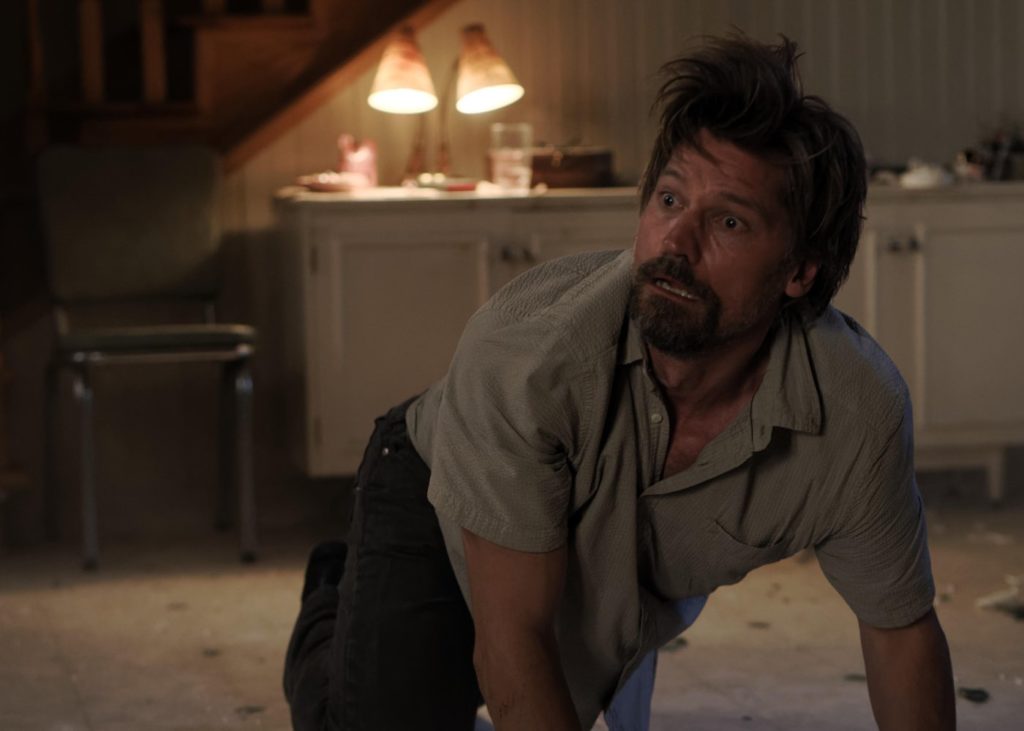
2017 heralds the arrival of the fourth Chattanooga Film Festival and the first year I have been able to attend. In its relatively short existence, the festival has acquired a stellar reputation with its programming of indie genre offerings and promises to be a treasure trove of films for DAILY GRINDHOUSE readers looking for something new.
FRIDAY, APRIL 7
HAPPY HUNTING
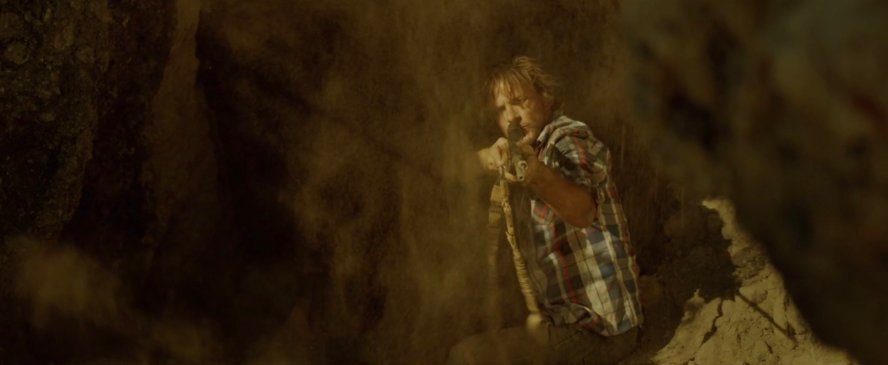
Day two of the festival for me started with HAPPY HUNTING. The debut feature from co-writer/directors Joe Dietsch and Louie Gibson, the film is a riff on the classic Most Dangerous Game scenario that revels in gratuitous violence and redneck clichés. In other words, what is not to like?
Warren (Martin Dingle Wall), a failed meth cook and overall pathetic excuse for humanity, receives word from his ex-girlfriend’s family in Mexico that she has died and left behind a daughter who belongs to him. With his life plans of drinking himself to death interrupted, he makes his way to a border town called Bedford Flats and waits for another call telling him where in Mexico he needs to go. But problems come in the form of some drug dealers he ripped off who are hot on his trail and that the residents of Bedford Flats enjoy a yearly hunt to kill what they consider the dregs of society. You can probably guess what happens next.
HAPPY HUNTING is an ugly, silly movie full of despicable characters using twisted logic to justify their actions. But that doesn’t mean that it isn’t fun. Dietsch and Gibson position the film as an allegory for the self-destructive nature of alcoholics, but this subtext (which is largely turned into text in several on-the-nose dialogue exchanges) is really beside the point. The film exists to watch several repellant characters get their violent comeuppance when Warren proves to be more than capable of fighting back.
I enjoyed HAPPY HUNTING more than I expected. It never comes close to being anything more than an exercise in suspenseful set pieces, violence, and redneck exploitation, but it does it with a certain panache and polish that doesn’t erase the grime and gore from the equation. But please, low budget filmmakers, quit using bad CGI fire.
DAYVEON
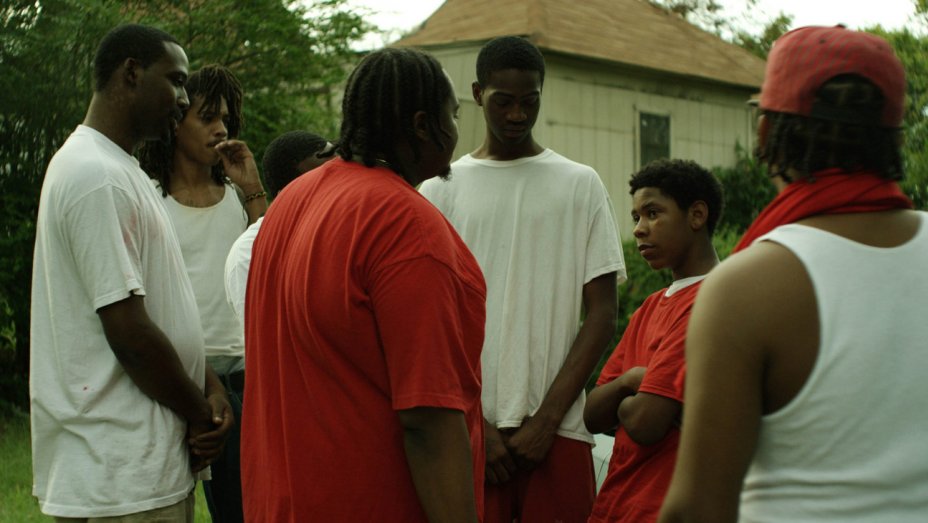
My second film of the day was DAYVEON. It is difficult to do a more abrupt change of direction from the relatively fun and grotesque HAPPY HUNTING.
A beautifully shot slice of life that is only saved from being one of the most depressing films I’ve ever seen by a slightly hopeful ending, DAYVEON is a difficult watch. But that difficulty is what makes it compelling, even when it is showing a similar character arc we’ve seen in countless films.
The titular character (Devin Blackmon) is an aimless thirteen-year-old living well below the poverty line in rural Arkansas. With no parents around and still mourning the loss of his older brother to a shooting a few years earlier, he lives with his older sister and her husband/boyfriend (the exact nature of their relationship is never made one hundred percent clear and it does not matter for the film). Despite the reasonably solid home life they provide, they are no substitute for actual parents or—more importantly to Dayveon—his big brother. Bored, lonely, and lacking adult guidance to which he will adhere, it is not surprising when Dayveon falls in with a local gang and starts taking part in low-rent stick up jobs.
Like I said, we’ve seen this particular story play out in many films. But the difference here is that writer/director Amman Abbasi (making his feature film debut), has populated his film with African-American characters played by what largely seems to be an amateur cast.
The current situation with poor African-American people in the rural south of this country is not a subject that is explored by many filmmakers but Abbasi plunges the audience headfirst into a world that many parts of this country never see with unnerving, but empathetic results.
The journey that Dayveon takes is absorbing, but the film is very slow moving (no surprise that its meditative view of the rural south reminds me of David Gordon Green’s early films when he and Danny McBride are on board as executive producers), so do not go into it expecting a fast-moving, exciting crime story. Abbasi keeps the film focused in on Dayveon and three other characters as they struggle with the poverty and criminal activities of their daily lives.
Utilizing tremendous cinematography by Dustin Lane that highlights brief moments of beauty found in nature between the long scenes set in dilapidated homes, convenience stores, and broken down, late model sedans, Abbasi’s film provides a painful glimpse into a part of American society that is under-represented in films.
KEDI
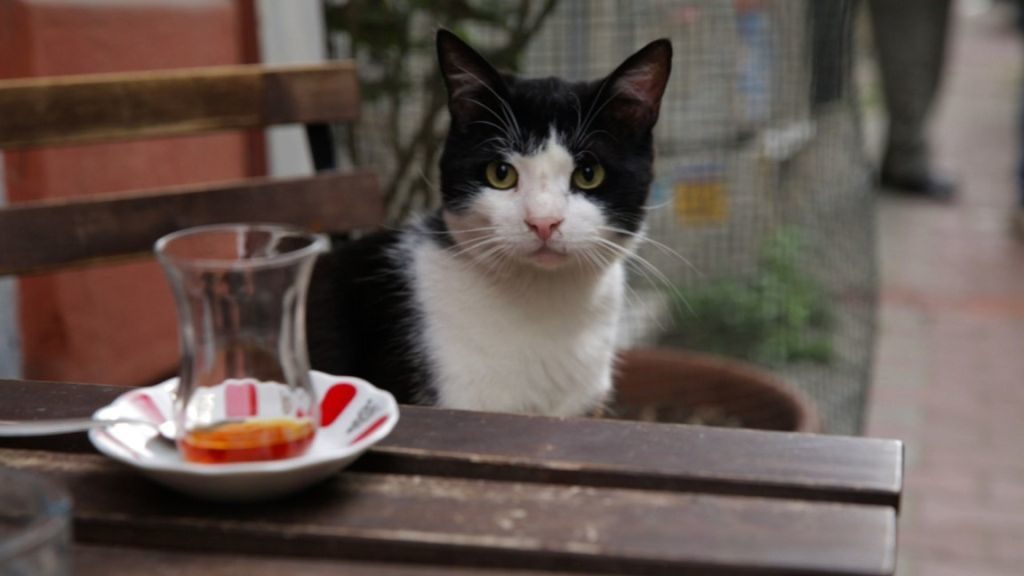
After the heavy subject matter of DAYVEON, it was nice to decompress with the charming, slickly directed documentary KEDI.
On the streets of Istanbul, hordes of stray cats wander. They have for thousands of years, becoming an accepted part of the city’s culture. Director Ceyda Torun takes on what should be the impossible task of following several of these cats and telling their story through their interactions with other cats and—just as importantly—with the people who care for and love them.
While the obvious draw of the film is to watch footage of hundreds of cats and kittens play, eat, fight, and rub against the nearest human leg they can find, Torun uses the presence of the felines to sneak in brief profiles of the people telling the story of the cats in their neighborhoods. Almost all of these profiles show how a connection with the cats has improved their lives. From a middle-aged woman who has trouble accepting death to an artist who bemoans the fact that her country has a poor record of the way it treats women to a man who suffered a nervous breakdown over a decade earlier, they find solace and a purpose in helping to take care of cats who belong to no one and everyone at the same time.
Filled with the already mentioned adorable cat footage and some beautiful overhead shots of the sprawling city of Istanbul, Torun occasionally touches on the sad fact that the city is changing as developers destroy old neighborhoods to put in modern shopping malls and apartment buildings. It is certainly a new take on the dark side of gentrification, but the film largely brushes by this concern to focus on the therapeutic power of loving such uniquely moody animals. And I am thankful that it takes on that angle.
SMALL CRIMES
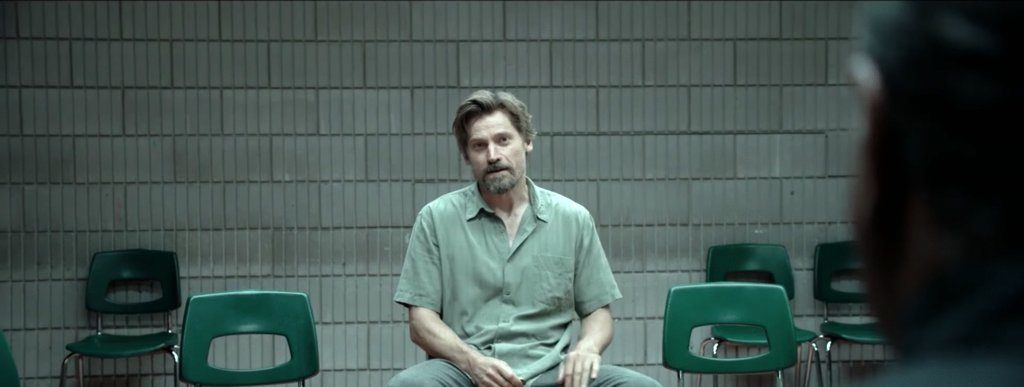
Co-writer/director Evan Katz made one of my favorite films of 2014 with the brutal, funny, and twisted CHEAP THRILLS. That put SMALL CRIMES very high on my list of films to see here. That it is co-written by the increasingly prolific Macon Blair (who made a great feature directorial debut this year with I DON’T FEEL AT HOME IN THIS WORLD ANYMORE) is just fuel on the fire of anticipation. Sometimes such high expectations can lead to a letdown when the film is finally seen. Thankfully, that was not the case this time.
“Brutal, funny, and twisted” is also a good way to describe Katz’ follow-up offering. While not as overtly political in nature as CHEAP THRILLS, SMALL CRIMES is just as cynically funny and observant about the extremes people will go to in order to protect themselves and the few people about whom they care.
When corrupt cop Joe (Nicolaj Coster-Waldau) is released from prison after six years for a botched hit on a district attorney (Michael Kinney), he really does seem intent on turning his life around. He has quit drinking, claims to be focused on repairing his relationship with his two young daughters, and wants nothing to do with the crime family he sold out his badge to years before. Within one day, he is back to drinking, comes face-to-face with the district attorney he tried to murder, discovers his ex-wife doesn’t want him anywhere near his children, and finds himself being pressured by another dirty cop (Gary Cole, wonderfully oily) to kill the dying head of the crime family before he can turn state’s evidence in a death-bed act of atonement.
Despite Joe’s proclamations of changing and trying to turn over a new leaf, he is clearly not capable of doing so. The question of the movie seems to be whether corruption infects the soul of people who do bad things or if corruption is always there and forces their actions? Having not seen what Joe was like earlier in his life, it is hard to know, but Katz seems to be leaning toward the latter. With that in mind, it is not surprising when Joe’s efforts at resolving his various problems in as bloodless a manner as possible keep blowing up in his face. As his father (Robert Forster) points out, where he goes, mayhem follows.
Despite its bleak viewpoint, SMALL CRIMES manages to stay entertaining through its witty script with a wide streak of dark comedy and a stacked supporting cast that includes Forster, Cole, Blair, Molly Parker, Jacki Weaver, Pat Healy, and Larry Fessenden. With those scene stealers available to pop up at any moment, it allows Katz to take the story in unexpected directions while never betraying the dark message at its center: some people can change, but others cannot—no matter how much they may want to.
Check out my Day One Dispatch here!
Tags: Amman Abbasi, Ceyda Torun, Chattanooga Film Festival, Cheap Thrills, Danny McBride, David Gordon Green, Dayveon, Devin Blackmon, Dustin Lane, Evan Katz, Gary Cole, Happy Hunting, I Don't Feel at Home in This World Anymore, Jacki Weaver, Joe Dietsch, Kedi, Larry Fessenden, Louie Gibson, Macon Blair, Martin Dingle Wall, Michael Kinney, Nicolaj Coster-Waldau, Pat Healy, Robert Forster. Molly Parker, Small Crimes

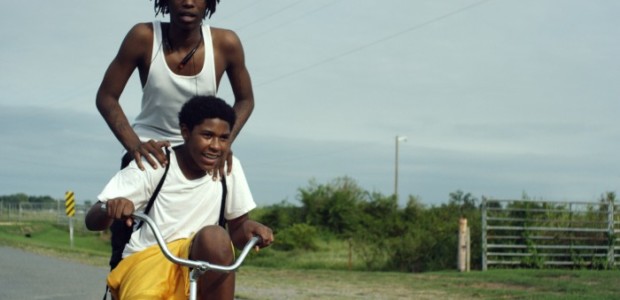
No Comments